The Weight of All We Leave Behind
After losing both parents, guest author Erica Ivanov returns to the cluttered Victorian house of her childhood and amongst the mess she uncovers the hidden strands of her family's story
Words and images: Erica Ivanov
The first time I entered the house on Walnut Street, I was nine years old and along for the ride to an estate sale. It was 1999 and my family of five had long outgrown our two-bedroom home about 40 minutes east of there. The house we were visiting was large, old, and cheap—a “fixer upper”. It didn’t occur to me that my parents might be interested in buying it. Built in 1905, the place felt more like a museum to me than a home, and my parents went to estate sales all the time. They both loved shopping for old “treasures” (or junk, depending on who you ask).
I barely remember that day. I only know it happened because after my parents’ offer was accepted, my mom would often remind me how pretty I said the lake view through the living room window seat was. Now, 25 years later, that dining room is again estate sale material—full of the possessions of the now deceased, my mom having died from cancer three and a half years ago, with my dad following three years later, killed in an accident near his home. Now, I face the task of cleaning out the house that I lived in from the time I was nine until I graduated high school. And I’m in no way exaggerating when I say that it is full of shit.
I grew up in a hoard. I was around seven when I noticed that my friends’ houses seemed to be a lot cleaner than mine. It wasn’t until I was in my mid-twenties that I learned of hoarding and its tendency to afflict people who have suffered a traumatic loss. After burying a child, the task of letting physical things go, knowing that they would be irretrievable, was insurmountably difficult for my dad (the subconscious mind’s ability to use symbolism is remarkable). My sister died at the age of 10 from a heart condition (I was an infant at the time). My parents stayed for years in a house that was far too small for our family because it was the house where she had lived. My mom wanted to move on, to get rid of her things, and to make a new home elsewhere. My dad, on the other hand, couldn’t let go.
The house held a series of clues to who my parents and sister were. Although she never lived in the house on Walnut Street, many of my sister’s possessions made their way there. In the living room, I found a large chest full of her clothes. There was even a small plastic purse with a single crumpled dollar bill and a discolored Jolly Rancher. I could picture her wearing the little purse, walking around the city she travelled to with my parents for medical treatments. It’s bizarre holding these things in my hands. It feels a bit like a “tease”. It solidifies the reality of her existence in my mind, and forces me again to face the fact that I will never know her.
In one of two large filing cabinets in the foyer, I found the medical records of the time surrounding my sister’s death, a note scrawled on my parents’ grief counselor’s notepad, and the bill for her cemetery plot. The day-to-day reality of what my parents experienced during that time is almost too painful to fathom. I wonder if they are better off resting together eternally than living with that reality.
On the basement floor, rotting and full of mold, I found a baby picture of my sister, the result of a leaky pipe whose aftermath was never cleaned up.
In a pile of clothes next to the washer, I found a pink pleather spring coat of my sister’s that I wore to church on Easter Sunday with my dad when I was 12. I remember this day well. After the service, we went to put flowers on her grave. It was the first time I ever saw my dad cry. As he knelt to set the flowers down, a single tear dropped from the corner of his eye. It was at that moment that I began to understand the impact that her death had had on my family. Having been only two months old at the time of her passing, when I thought of her it was with an attitude of “you can't miss something you never had”. Later that day, I found myself sobbing in my room, thinking about the opportunity that I had lost. She was my only sister. Left behind with two older brothers, the idea of growing up with a sister seemed like a dream. I still feel that way about it.
Through photos, journal entries, and intimate letters, all found in the house, I have a much clearer picture of my parents’ early years and courtship. In a letter my mom wrote at the age of 19, she describes to my dad how anxious she is that he may not show up for their date, going into detail about waiting in her room for the moment when her mom called her downstairs. If these two had known what their future together held, would they seek other company? I’ll never know, but part of me thinks they might have been better off.
In a wardrobe chest in the attic, I found photos, cologne, cigarette “samples”, and mail addressed to the house my dad lived in until he married my mom. I pulled it up on Google Maps. It’s still there. I think about mailing a copy of one of the photos of him standing in the backyard in a white T-shirt, snow piled up behind him. Would the person who lives there now find this at all interesting?
There’s a package of photos of him and his brothers, taken in the late ‘60s. Dad is playing the drums and piano. He looks relaxed, confident. These are not words that I would use to describe the father I knew. I think of him as incredibly anxious, and timid but quick to anger. I wonder how much his lived experience changed him.
In my dad’s bed, I found the journal my sister wrote in a few days before she died. This is the type of thing I would have expected to find buried in a box in the attic, or in a dresser drawer. The fact that he kept it next to him while he slept underscored his suffering. On the date of my dad’s death, my sister had been gone for 33 years.
I cleared off my mom’s desk in the dining room. Here were the remnants of her day-to-day life before she got too sick to sit at her computer—notebooks, vitamin and essential oil bottles, crystals, and a cute sturdy little box of chemo care necessities that the hospital had given her when she started treatment. She spent many hours here, facing the window so that she wouldn’t have to rest her eyes on the mess surrounding her. She led herself down many internet rabbit holes this way, compulsively posting on Facebook about all the latest conspiracy theories, sometimes hundreds of posts over the course of a few hours. Clearing off this desk involved wading through three years of the debris of my dad’s and brothers’ lifestyles—empty plastic bottles, old mail, and more than one large pile of mouse shit. As I picked up each object to decide what to do with it, I wondered whether my mom ever imagined this scene. In her last few weeks of life, she apologized more than once for the mess she was leaving behind. Was she referring to this literal mess, or the mess that she knew my dad was as a person?
Looking past the desk and through the window, I can picture my mom there, as she must have pictured herself when she bought the place—in the dining room of a 1905 Victorian house, adjacent to a cushioned window seat with a view of the lake. I can relate to this tendency to romanticize; it was her ability to do this that led her to decide to buy this fixer-upper in 1999, and then neglect to fix it up. I can see the garage that is about to collapse. When we moved in, my dad parked one of the classic Lincoln cars that he collected. The car is still inside, with a fallen beam resting on its roof.
Cleaning out this house has been many things—frustrating, disgusting, infuriating, stressful, enlightening, comforting, traumatic. Despite the stress, I’m grateful that I have been able to work through it. Our relationships with loved ones continue long after their deaths. From the house on Walnut Street, I’ve brought home a figurine of a drummer that my mom must have bought for my dad. It reminds me that despite their struggles, there was love between my parents. I found a trivet made by my sister that we used regularly on the dining room table. It reminds me that my parents must have found some comfort in keeping reminders of her around. And I look forward to selling the house to someone who will be happy to restore it. Maybe someone worthy will finally be able to live out my mom’s dream of admiring the lake view through the dining room window of their beautifully restored 1905 Victorian home.


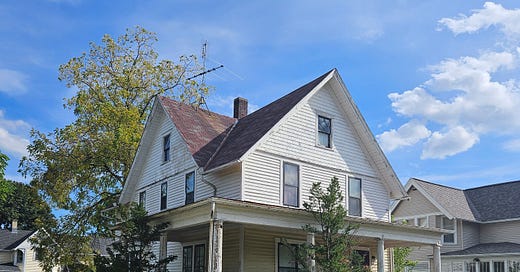


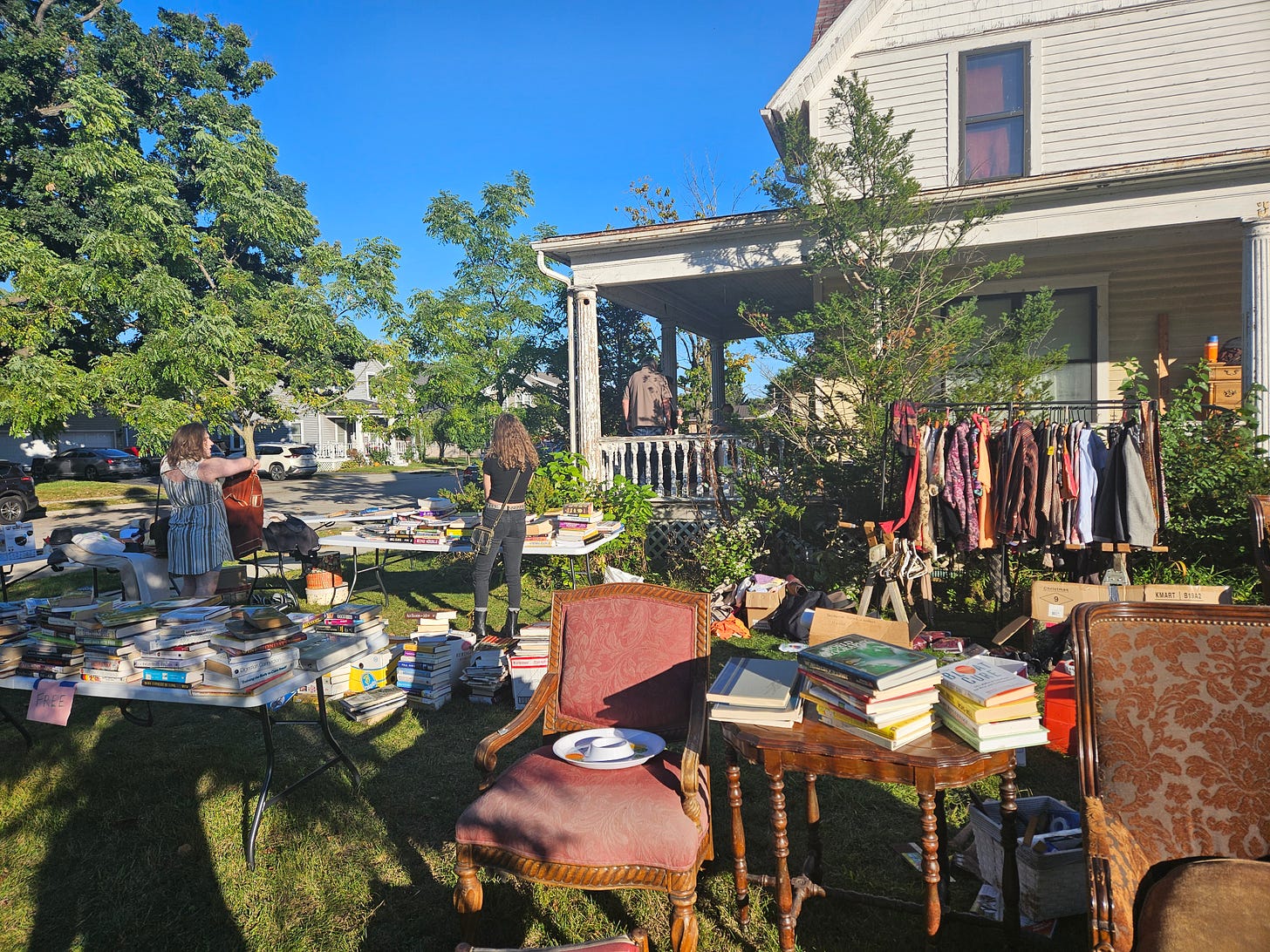
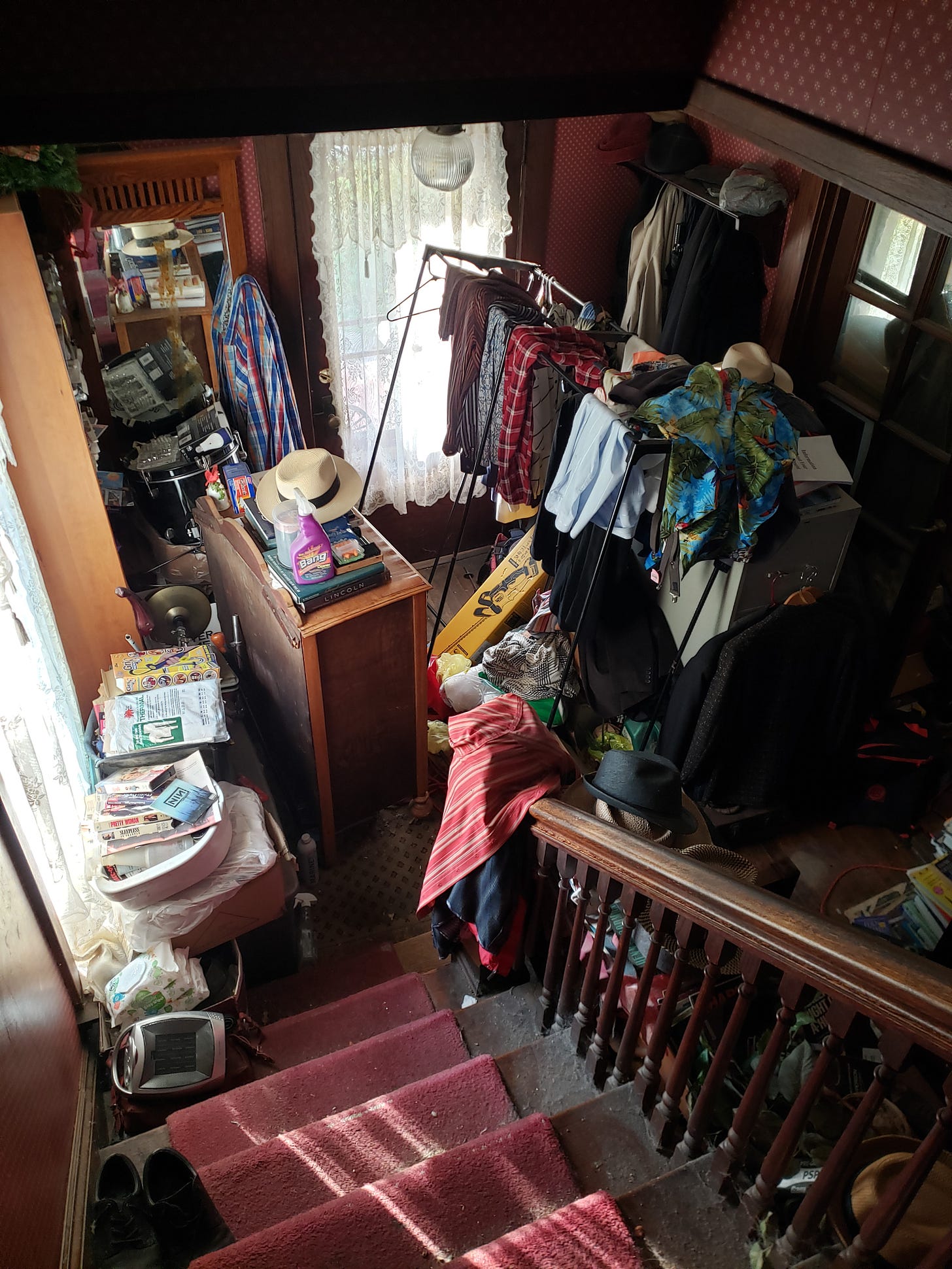
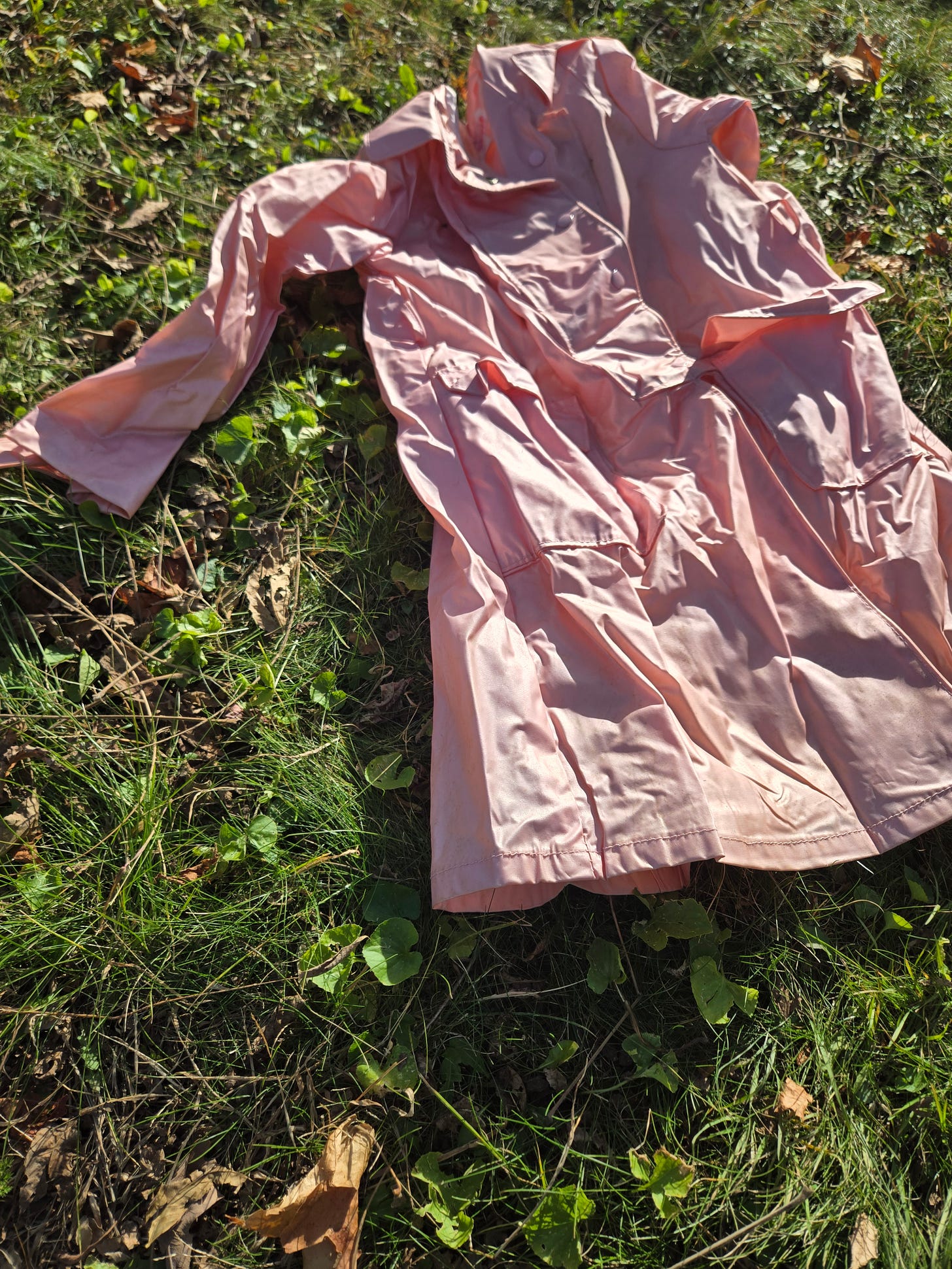
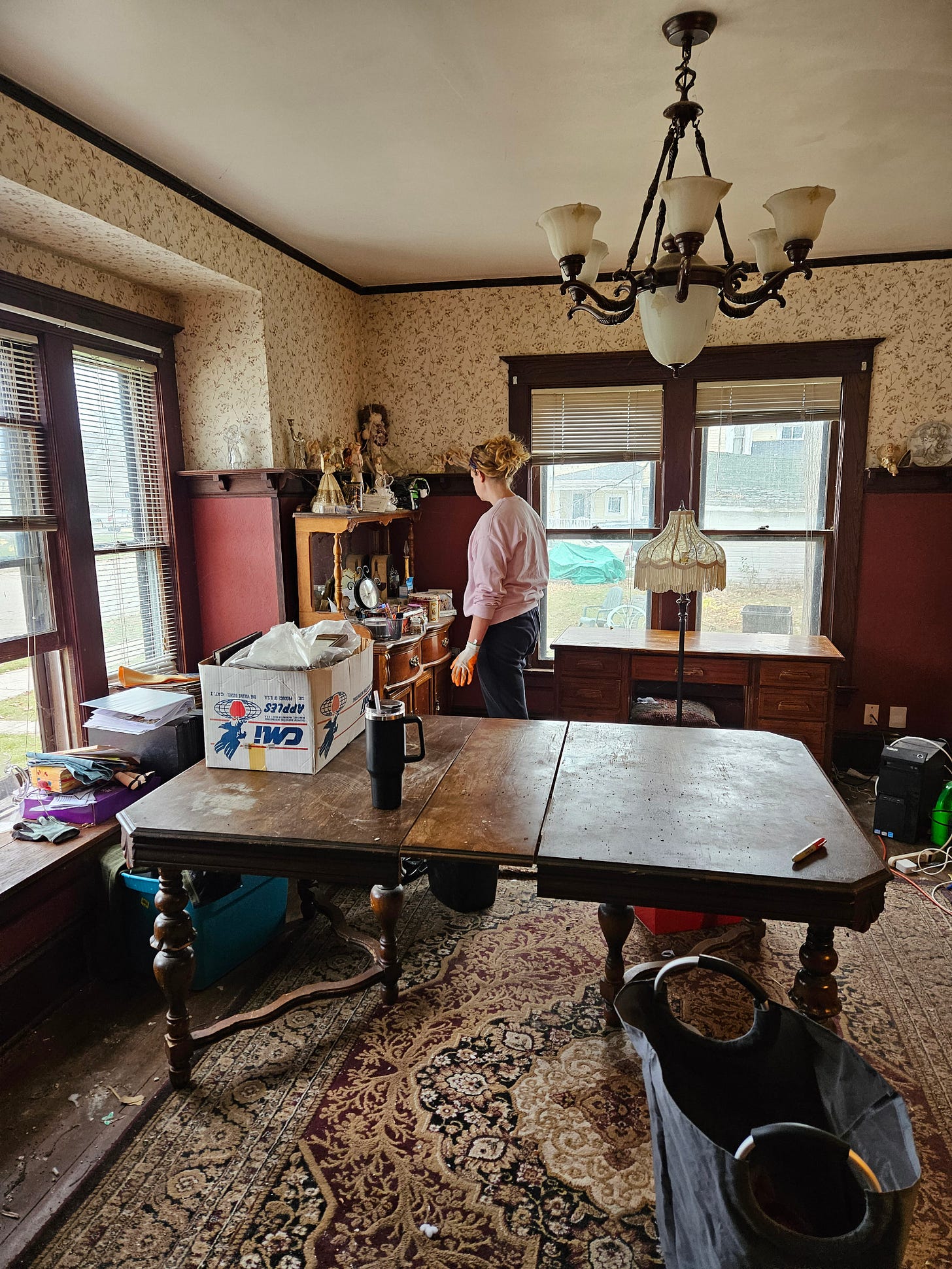

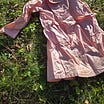
Clearing out the big old house was the hardest thing I ever had to do. I related so much to the last line, of hoping the next family can live out the dreams my mother wanted to, before the weight of grief turned her into a hoarder. I kept trying to give my mother those dreams, so much so I was almost too late to give myself my own. To outsiders I had the privilege of growing up in a beautiful character home, no one knew what was behind the carved oak doors. They'll never know.
This must have been such a difficult experience- I already dread cleaning out my hoarder father's stuff, and that's just stuff, not adjacent to such a heavy grief. I loved your account of it, though, and hope that house has the opportunity to fill with joy